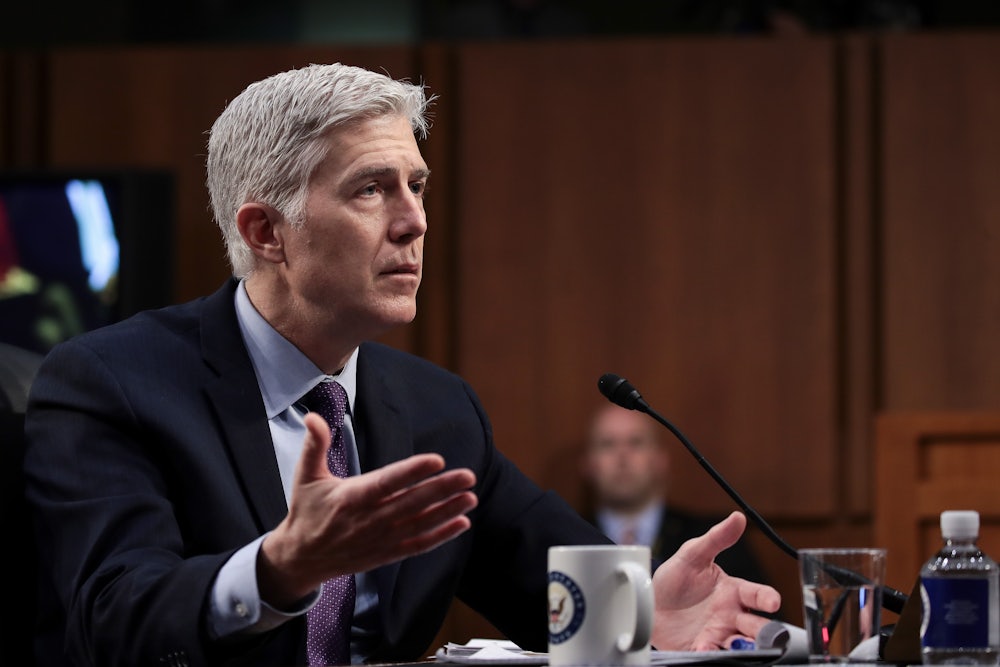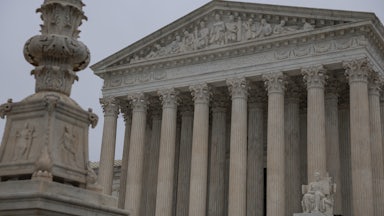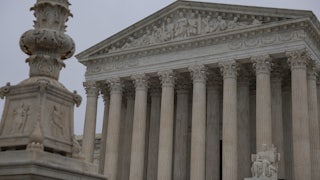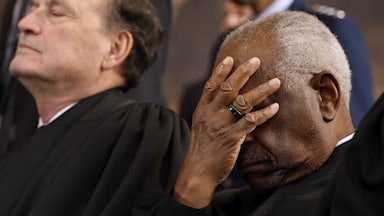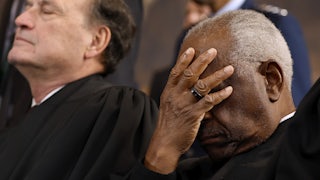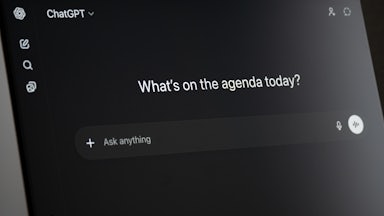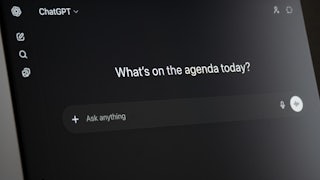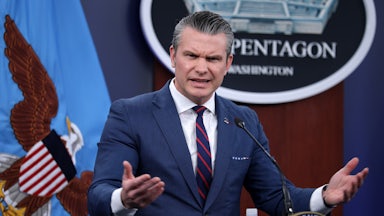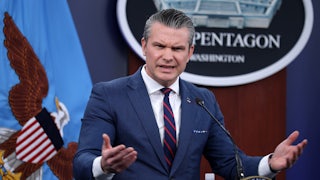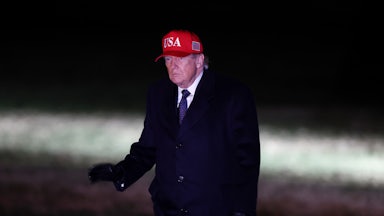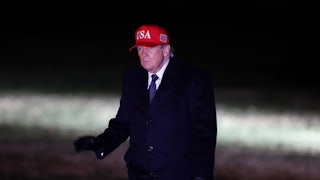The Supreme Court announced on Thursday that it would dismiss the litigation over the Title 42 orders, ending a years-long legal battle over pandemic-era border restrictions. The Trump administration invoked the statute in 2020 on public health grounds to expel thousands of migrants and asylum-seekers at the southern border. With the Trump-era policy set to expire later this month, the court recognized that any further consideration would be moot.
None of the justices disagreed with this. But in an attached statement, Justice Neil Gorsuch took the opportunity to discuss how the country handled the Covid-19 pandemic in general. “Make no mistake—decisive executive action is sometimes necessary and appropriate,” he wrote in Arizona v. Mayorkas. “But if emergency decrees promise to solve some problems, they threaten to generate others. And rule by indefinite emergency edict risks leaving all of us with a shell of a democracy and civil liberties just as hollow.”
Reflecting on the early pandemic and the mistakes that public officials made is important. I’ve previously written that Congress should create a 9/11-style commission to investigate crucial initial failures that hampered the subsequent response. At the same time, Gorsuch’s concerns about the fate of American democracy during the pandemic are, at best, deeply misplaced.
The justice began by recounting the complicated legal history behind the Mayorkas litigation. I will not do so here since I am not bound by the same norms of judicial writing as Gorsuch, and also because what happened with Title 42 is not really salient for this article. Suffice it to say that Gorsuch is frustrated with how the litigation between various parties played out on a procedural level, including when his colleagues “effectively allowed nonparties to this case to manipulate our docket to prolong an emergency decree designed for one crisis in order to address an entirely different one.”
He then moved into a broader argument about the Covid-19 measures themselves. “Since March 2020, we may have experienced the greatest intrusions on civil liberties in the peacetime history of this country,” Gorsuch wrote. “Executive officials across the country issued emergency decrees on a breathtaking scale. Governors and local leaders imposed lockdown orders forcing people to remain in their homes. They shuttered businesses and schools, public and private. They closed churches even as they allowed casinos and other favored businesses to carry on. They threatened violators not just with civil penalties but with criminal sanctions too.”
Federal officials, he noted, also joined in with a variety of emergency measures. “They deployed a public-health agency to regulate landlord-tenant relations nationwide,” Gorsuch wrote. “They used a workplace-safety agency to issue a vaccination mandate for most working Americans. They threatened to fire non-compliant [civil service] employees, and warned that service members who refused to vaccinate might face dishonorable discharge and confinement. Along the way, it seems federal officials may have pressured social-media companies to suppress information about pandemic policies with which they disagreed.”
At the same time, Gorsuch claimed that the other two branches of government went quiescent. Congress and state legislatures, he wrote, “too often fell silent” while even courts “bound to protect our liberties addressed a few—but hardly all—of the intrusions upon them.” He did not exclude his own court from blame here. “In some cases, like this one, courts even allowed themselves to be used to perpetuate emergency public-health decrees for collateral purposes, itself a form of emergency lawmaking by litigation,” he noted. This, he strongly suggests, was a mistake.
Was it? I should start by noting that the “may” in Gorsuch’s line about Americans having just experienced “the greatest intrusions on civil liberties in the peacetime history of this country” is load-bearing. Naturally, it is hard to rank these sorts of things. I would only note that slavery and Jim Crow laws both existed during this country’s peacetime history, and the deprivations of liberty that they entailed were more comprehensive and more enduring than any Covid-19 measure. This country’s manifold injustices toward Native Americans, with which Gorsuch is more familiar than most, should not be overlooked either.
I point this out not to score easy points but to provide a better sense of perspective about what just happened. It is indisputable that many Americans’ rights were temporarily curtailed. But they weren’t curtailed out of malice, or from a desire for cruelty, or to bring about a new tyranny. More than one million people have died in the United States from Covid-19. The pandemic killed more Americans than any other single event in this country’s history. It eclipsed the Civil War, which previously held the record with more than 600,000 deaths, and World War II, the only comparable instance of mass American death within living memory.
Almost all levels of the American state—from county health officials urging people to get vaccinated to congressional leaders who poured trillions of dollars into emergency relief—were trying to save lives. That is why I am unpersuaded that “peacetime” makes much sense as a distinguishing characteristic here. For the last three years, this country was for all intents and purposes on a war footing—and a not too unfamiliar one at that. Instead of air-raid drills and blackout curtains, there were building occupancy restrictions and Zoom meetings. Instead of victory gardens and food rationing, there were face masks and social distancing. Instead of the Manhattan Project, there was a race to find a vaccine.
Gorsuch and the rest of the Supreme Court are well aware of this because, as he noted, they played their own role in it. Deciding to not use power can be just as difficult as using it. The justices, to their credit, allowed public health officials who were responsible to the American electorate to make crucial decisions in the heat of the moment. The high court did not actively begin to rule against various public health measures until after vaccine distribution had begun. I am sure that wasn’t easy for the justices, given the novelty of what was happening and the legal stakes involved in some cases, but it was still a commendable act of judicial restraint.
The reference to state leaders who “closed churches even as they allowed casinos and other favored businesses to carry on” is also telling. It is a great historical misfortune that the Supreme Court’s earliest major cases about Covid-19 measures came from Nevada. The state’s leaders issued emergency directives that restricted church attendance while allowing casinos to remain open in a limited manner. The juxtaposition was apparently damning for a court that is often friendly toward religious-freedom plaintiffs, even though a narrow majority of justices allowed the measure to go forward. The conservative justices’ frequent references to it in later rulings suggested that it played an outsize role in shaping their thinking on the matter.
Gorsuch went on to frame Covid-19 measures as a blow to democratic government and a warning of what could happen in the future. “One lesson might be this: Fear and the desire for safety are powerful forces,” he argued. “They can lead to a clamor for action—almost any action—as long as someone does something to address a perceived threat. A leader or an expert who claims he can fix everything, if only we do exactly as he says, can prove an irresistible force. We do not need to confront a bayonet, we need only a nudge, before we willingly abandon the nicety of requiring laws to be adopted by our legislative representatives and accept rule by decree.”
“Along the way, we will accede to the loss of many cherished civil liberties—the right to worship freely, to debate public policy without censorship, to gather with friends and family, or simply to leave our homes,” Gorsuch continued. “We may even cheer on those who ask us to disregard our normal lawmaking processes and forfeit our personal freedoms. Of course, this is no new story. Even the ancients warned that democracies can degenerate toward autocracy in the face of fear.”
This is a blinkered perspective at best on what happened. For one thing, almost no elected officials chose to “disregard our normal lawmaking processes” during the pandemic. Many states had broadly written public health laws for exactly such an event, albeit ones that had lain moribund on their statute books since the early twentieth century. And if anything, the opposite of Gorsuch’s claim about legislative silence is true: Congress passed more major legislation to greater policy effect in the early pandemic than normal, including the Cares Act and the American Rescue Plan. The Centers for Disease Control and Prevention’s eviction moratorium, for example, was a replacement for a measure initially enacted by Congress.
And if Gorsuch’s argument is that exceeding those statutes’ authority amounts to “rule by decree,” then the same thing can be said about any nonpandemic instance where executive branches exceed their statutory power. The Supreme Court has heard three cases where the executive branch allegedly went beyond his power to fight the pandemic. The CDC said its eviction moratorium could be issued under a 1944 provision of the Public Health Act. A majority of justices disagreed. The Occupational Safety and Health Administration said it could impose a national testing mandate for Covid-19 through the agency’s foundational 1970 law. A majority of the justices disagreed. The Department of Education said it could wipe away millions of dollars in student debt under the Heroes Act of 2003. A majority of the justices might disagree later this term.
Most importantly, there is little evidence to support the idea that American democracy “degenerated” in any way because of the pandemic itself. I cannot stress enough that the American people generally supported the emergency measures that their elected officials took. Opposition voices may have been the loudest and most amplified ones that were heard, thanks in large part to the conservative media ecosystem and a Twitter-happy president. But they were not a majority when it mattered most.
The Pew Research Foundation, for example, noted that every major public health measure taken in the early pandemic, including school and business closures, had overwhelming public support. A Kaiser Family Foundation survey in December 2020 found that 78 percent of Americans thought their state had either the right amount of restrictions on businesses or not enough of them; those who wanted even fewer restrictions were a small minority. Even some of the most controversial measures, like masking children in reopened schools, were evenly divided instead of mostly opposed, according to Gallup.
The first year of the pandemic also coincided with an election year, giving us the clearest possible picture of how Americans viewed the restrictions. No incumbent governor lost their reelection bid that year; the only governor’s office to change party control was in Montana, where the Democratic incumbent ran for a Senate seat instead. And while California Gavin Newsom faced a recall campaign over his handling of the pandemic the following year, he ultimately won that race with more than 60 percent of the vote. In fact, the most prominent incumbent to lose in 2020 was former President Donald Trump, who opposed many Covid-19 restrictions imposed by other officials once he perceived them to be a threat to his reelection.
Trumpism is where Gorsuch’s claims about the pandemic and American democracy ultimately falter. When future generations of Americans look back at this first half of this decade, stay-at-home orders and school closures will not be what comes to mind when they think of existential threats to the republic. An American president who encouraged his followers to gather in Washington and march on the Capitol, where they then tried to hunt down opposition lawmakers and lynch the vice president for not overthrowing the election results, will probably loom a little bit larger.
This is also where Gorsuch’s claims about the pandemic and democracy devour themselves. To his credit, he identified the National Emergencies Act as a possibility for reform by Congress, noting that dozens of supposed “emergencies” are still on the books today. But his solution to perceived misgovernance by governors and presidents is not just for lawmakers to do more. He also wants future generations of judges and justices to be more aggressive in constraining public health measures.
“At the very least, one can hope that the judiciary will not soon again allow itself to be part of the problem by permitting litigants to manipulate our docket to perpetuate a decree designed for one emergency to address another,” Gorsuch wrote. I do not begrudge him his frustration with the labyrinthine Title 42 litigation. But it would be a mistake for it to metamorphose into a turn against the traditional judicial deference to public health officials. Courts have historically recognized that they are ill equipped to do such a thing, not only because they lack the expertise to devise public health measures but also because the electorally accountable branches are better in tune with public sentiment and support. For a justice who is typically more perceptive about the importance of judicial restraint, including in a recent ruling just this term, this would be an unusual misfire.
Humans have a habit of trying to forget about pandemics. Sometimes that’s impossible, like when the Black Death killed half of Europe in the fourteenth century. But often it’s surprisingly easy. Tens of millions of people died during the 1918 influenza epidemic, which was within living memory until recently but was largely forgotten about in popular history. This is partly because it coincided with the end of World War I and wartime censorship, but also because people who lived through that era didn’t want to remember it. There are almost no public memorials to that pandemic’s dead in the country today; there will probably be few, if any, to the more than one million Americans who lost their lives to Covid-19.
That is a tragedy in and of itself. An even greater tragedy than to forget the Covid-19 pandemic would be to misremember it. I would be foolish if I defended every single public health measure undertaken over the last three years. I certainly wish some things had been done differently by various public officials. But I would always rather have the pandemic-fighting measures I live under devised by someone I can later vote out of office—by someone who fears the scorn of the electorate if they act in error—than by a Supreme Court justice who serves for life, has no relevant training or expertise in epidemiology, and will never appear on a ballot in my polling place. That alternative is a greater threat to American democracy than any masking mandate or stay-at-home order could be.
